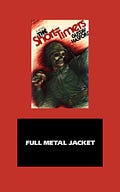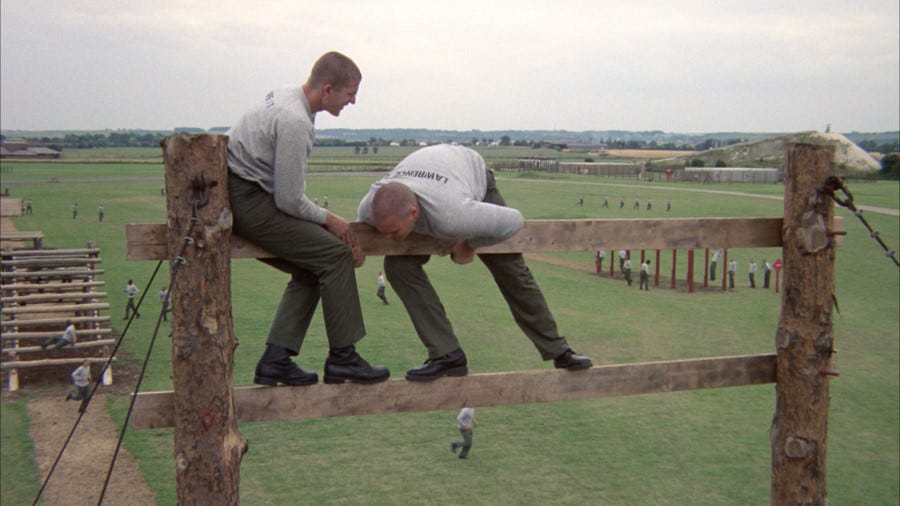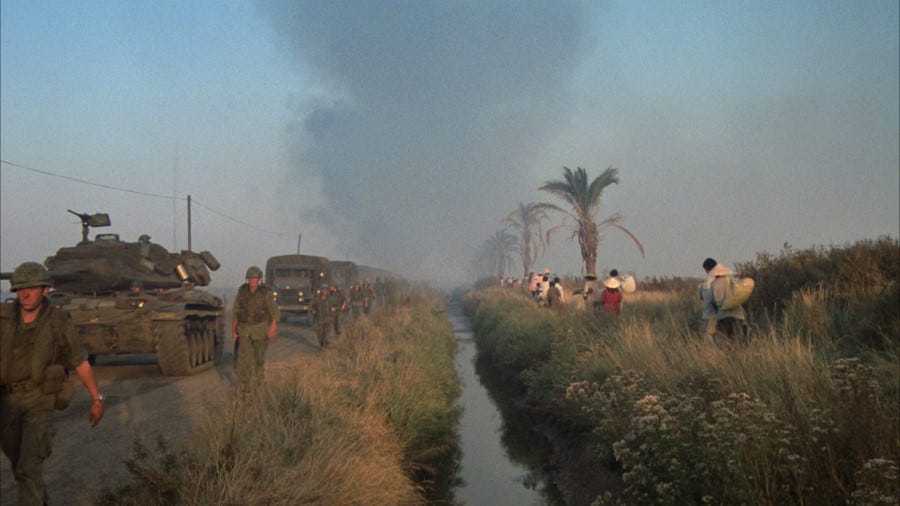This is the tenth and penultimate letter in a reading series on books adapted by Stanley Kubrick, while also reading along with a new biography of the filmmaker by Kolker and Abrams called KUBRICK: An Odyssey.
Gustav Hasford: The Short-Timers. New York: Bantam, 1983 [1979].
Michael Herr: Dispatches. New York: Avon Books, 1978 [1968].
The novel by Gustav Hasford that ended up as Full Metal Jacket is a fantastic book, a true speeding bolt of war fiction. The source of the film’s brutal economy is the essence of the book: if anything Kubrick further reduced the novel’s three parts into two.
This letter will be short so that readers will have more time to read the books concerned. As your host read more about the production of FMJ, it became necessary to look at Michael Herr’s famous book Dispatches. Both texts are actually baked into the film’s DNA.
While it wasn’t a hit compared to its “competing” Vietnam war movies, FMJ is still credited for pioneering cinematic reflections of this still-recent American military disaster, since it was the first to begin production. And its leaning on two of the best-written books on the subject your host as encountered outside of formal historical writing ensures that it’s arguably the best one, and an underrated piece of Kubrick’s filmography.
One understands why Hasford objected to the casting of the brilliant R. Lee Ermey for the drill sergeant in the movie: in the book the character is an obvious caricature. “The senior drill instructor is an obscene little ogre in immaculate khaki.” Even the sargeant’s death in the book is more cartoonish.
Everyone loves the first half of FMJ at the Parris Island boot camp — Billy Wilder apparently called it the most perfect 45 minutes of cinema ever created. But your host happens to like the entire film evenly, and it’s in the country that Hasford’s novel and his narrator Private Joker principally dwell.
Joker is a war correspondent like in the film (and point that struck Kubrick on the personal level).
The article I actually write is a masterpiece. It takes talent to convince people that war is a beautiful experience. Come one, come all to exotic Viet Nam, the jewel of Southeast Asia, meet interesting, stimulating people of an ancient culture . . . and kill them. Bethe first kid on your block to get a confirmed kill.
That’s what they mean by a “terse spitball of a book.”
Later on, this is how Joker sounds off against Captain January of the ISO, like something out of Catch-22:
“No, sir. We bomb these people, then we photograph them. My stories are paper bullets fired into the fat black heart of Communism. I've fought to make the world safe for hypocrisy. We have met the enemy and he is us. War is good business — invest your son, Viet Nam means never having to say you're sorry. Arbeit Macht Frei—”
“Sergeant Joker!”
“Negative, Captain. Number ten. Tm a corporal. You can send me to the brig, sir — I know that. Lock me up in Portsmouth Naval Prison until I rot, but let me rot as a corporal, sir. You know I do my job. I write that the Nam is an Asian Eldorado populated by a cute, primitive but determined people. War is a noisy breakfast food. War is fun to eat War can give you better checkups. War cures cancer — permanently. I don t kill. I write. Grunts kill; I only watch. I'm only young Dr. Goebbels. I'm not a sergeant.” I add: “Sir.”
But it’s a much more horrific vision than even in Heller’s book. The sequence with the Vietnamese sniper, memorably captured in the film, reads like a splatterpunk horror fiction. In fact, the impact of Vietnam imagery on pulp horror of the 70s and 80s seems indelible in Hasford’s prose. Even Herr’s book captures grisly poses of dead human beings that may have been recreated as the kills in certain slasher movies…
It became clear from reading the biography that Herr’s famous piece of correspondence Dispatches from 1968, reporting on the Tet Offensive and battle of Ke Sahn with raw immediacy.
The savage tone is still there, but Herr’s lines are longer and hypnotic where Hasford was so taught and punchy. Look at these reflections of the indigenous “enemy”: reflections at the cultural level: Catholicism vs. Buddhism:
Holy war, long-nose jihad like a faceoff between one god who would hold the coonskin to the wall while we nailed it up, and another whose detachment would see the blood run out of ten generations, if that was how long it took for the wheel to go around.
A lot of people knew that the country could never be won, only destroyed, and they locked into that with breathtaking concentration, no quarter, laying down the seeds of the disease, round eye fever, until it reached plague proportions, taking one from every family, a family from every hamlet, a hamlet from every province, until a million had died from it and millions more were left uncentered and lost in their flight from it.
It was hard not to read the following lines without thinking about the massacres in Gaza by Israel and the US. Herr brings us up against the prospect of sympathizing with the soldiers of an imperialist army — of course, they were drafted, while there are many internationals voluntarily going to the middle east to slaughter for the interests of imperialism.
I stood as close to them as I could without actually being one of them, and then I stood as far back as I could without leaving the planet. Disgust doesn't begin to describe what they made me feel, they threw people out of helicopters, tied people up and put the dogs on them. Brutality was just a word in my mouth before that. But disgust was only one color in the whole mandala, gentleness and pity were other colors, there wasn't a color left out. I think that those people who used to say that they only wept for the Vietnamese never really wept for anyone at all if they couldn't squeeze out at least one for these men and boys when they died or had their lives cracked open for them.
And lest we forget this is the same year King was murdered in Memphis. Hence this striking passage between Herr and a Black noncom, looking at the prospect of bringing his military training to bear on protesters back in the States.
"But dig it. Am I gonna take 'n' turn them guns aroun' on my own people? Shit!" That was it, there was hardly a black NCO anywhere who wasn't having to deal with that. We sat in the dark, and he told me that when he'd walked by me that afternoon it had made him sick. He couldn't help it.
Out of the chapters running up to FMJ’s production in the biography, three fascinating points stand out.
The first is that Kubrick took concern with home video release and their impact on film markets very quickly, in the context of media conglomeration leading to a neglectful treatment of film archives. “Columbia had lost the fine-grained picture and sound negatives of Dr. Strangelove in a fire. …With the advent of home video, he became even more involved in preserving his cinematic legacy. He and Leon Vitali would assiduously make sure that the best prints were used and the transfers to video were of the highest quality.”
The second is that Kubrick was still interested in adapting Traumnovelle: it looms as the final destination, even though Eyes Wide Shut is still a decade out. He consulted with Shining co-writer Diane Johnson, Terry Southern, as well as the spy novelist John le Carré — Kubrick was truly a literati guy.
And the third point, tragic though it may be, is that Spielberg’s E.T. (1982) broke Stanley’s brain. Kubrick would “regularly request box-office figures” for Spielberg’s releases. He became fixated with doing another science fiction project, collaborating with SF writer Brian Aldiss: “Stanley was convinced that one day artificial intelligence would take over and mankind would be superseded.”
The same year E.T. came out SK read The Short-Timers by Gustav Hasford: “a unique, absolutely wonderful book, almost poetic in its carved-out, stark quality.”
Kubrick and Hasford did not get along well at all; things were much smoother with Michael Herr, who also contributed to Apocalypse Now and Platoon. (The chilling line about “don’t lead ‘em as much” in the film is from Dispatches.) They both worked on the screenplay in the early months of 1985.
Hasford, who “was stealing and hoarding books from dozens of libraries in the UK, the US, and even Australia,” snuck onto the set pretending to be Herr. Kubrick did eventually give Hasford full screenwriting credit — and tried to appeal against Hasford’s eventual arrest for book thieving.
In the same period of Hasford’s crash-out, a funny story from the set:
D’Onofrio remembered three hundred extras waiting while Kubrick fiddled with a camera on top of a crane. One extra lost patience and muttered, ‘Get off the crane.’ An assistant said, ‘You’ll never get a chance like this; you’re working with Stanley Kubrick, so watch it. No talking.’ Another long wait. Still Kubrick didn’t come down. ‘Get off the fucking crane,’ another extra yelled. This time Stanley descended. ‘Who fucking talked?’ he asked. A voice comes from the back: ‘I am Spartacus!” Then another: ‘I am Spartacus!’ Kubrick guffawed along with the horde of extras.




